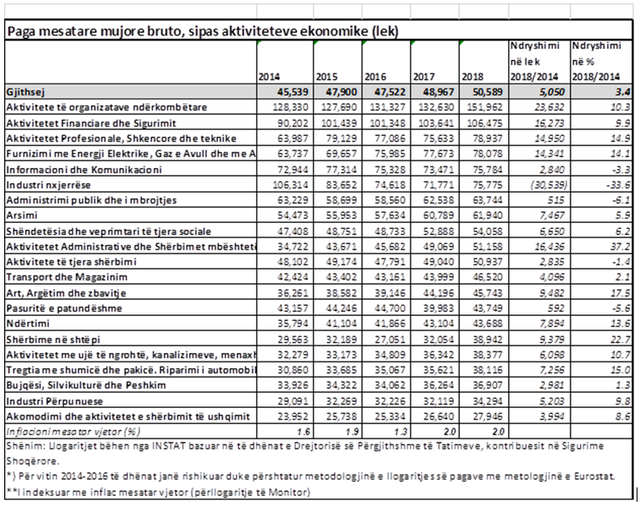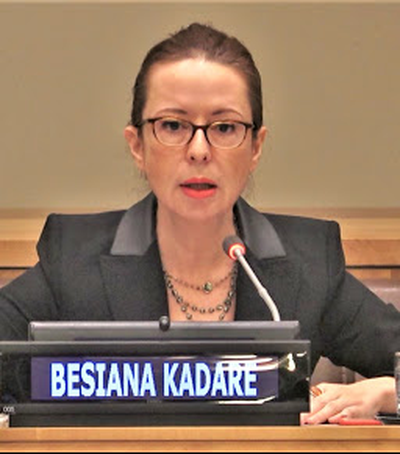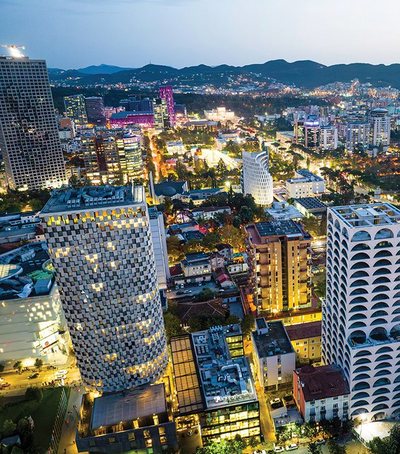Today is May 1st, which is internationally recognized as the Workers Day, which originated in Chicago in 1886 and later in 1904, when workers' unions demonstrated energetically to set the 8-hour working day.
115 years later, Albanian workers are Europe's most underpayed (the minimum wage of 211 euros is the lowest in Europe), work on average 200 hours a year more than Europeans, according to Eurostat, while there is an informality in the labor market from about 30%, which means that one in three employees, or they are not paid insurances, or declares a salary lower than the real one, according to a recent observation by the Regional Co-operation Council (CoR).
But how has the average wage in the economy changed over the past four years and what are the economic activities (companies and institutions) that pay more employees?
The average salary in the economy in 2018 was 50.6 thousand lek, or about 405 euros. According to the tables published by INSTAT, compared to 2014, salaries have increased by 11%, or about 5 thousand lekë, or by 40 euros. But indexed to the average annual inflation, the average wage in the economy compared to 4 years ago has risen only by only 3.4%.
Institutions that pay most employees are international organizations. The average salary in these institutions is around 152,000 leks (about 1,200 euros), which is three times the average salary in the country. International organizations have increased their salaries to their employees in absolute value in recent years, with nearly 200 euros more than in 2014.
Second, banks and insurances are listed with an average salary of about 106 thousand ALL (850 euros) per month. Even insurance banks have promoted their employees year after year with average salaries that are 130 euros higher than in 2014. But growth rates have slowed down over the last two years, especially as the banking system is not expanding and has been in a hectic buying-in process. In banks there are high spreads of around 300 euros for low levels (cashier), at 7-10 thousand euros on average for senior management levels.

International Organizations, Banks and Insurance are activities that reward their employees with relatively satisfactory salaries, while other sectors pay on average less than 80,000 ALL per month.
Third, there are Professional, Scientific and Technical Activities, with an average salary of 79,000 ALL per month, with a 15% increase compared to four years ago.
Electricity, steam and gas supply pays an average of 79,000 leks a month, with an increase of 14% over the last four years. Though they are generally state-owned companies operating in this sector, they function as anonymous companies, and result in high profits while paying on average more than the state.
Information and Communications has an average salary of about 75.8 thousand ALL per month. Indexed with inflation, wage growth has been negative for this sector, as a result of lowering competition, following the exit of the fourth operator market.
Another activity that has seen a sharp drop in wages is the extractive industry, which had an average salary of 75.7 thousand leks in 2018, or 30.5 thousand leks (240 euros) less than in 2014. This sector has not spent the good times in recent years, as a result of the unfavorable conjuncture of international markets.
In public administration and defense , the average salary was 63.7 thousand lekë, with a real decrease of 6.1% compared to 2014.
Education has an average salary of nearly 62,000 ALL, with a real increase of 6% in relation to four years ago.
An activity that has emerged in recent years is home-based services , which cost nearly 40,000 leks a month, up 23% compared to four years ago.
While those who pay less their employees in Albania are the accommodation and food service activities, with only 28 thousand leks per month, where the most unpaid are the waiters who are compensated by the bakshishet./ monitor.al /






